4.2 Die Rückkehr der Wölfe
Lektionsüberblick
Wolves, which had been extinct for well over a century in Western Europe are making a comeback. How society should respond to the return of the wolves is a controversial topic, because it touches many aspects. In this lesson, you will learn to 1) identify important vocabulary needed to express the wolf situation in German-speaking Europe, 2) use simple structures to describe the situation, and 3) express agreement or disagreement with a statement.
1) Wichtige Vokabeln zum Thema Wölfe
To begin, let’s explore a bit of context around this controversial topic. You can read the following short articles in English, noting the important vocabulary and ideas discussed.
- Study reveals how gray wolves recolonized Germany – Earth.com
- The Wolf Returns to Germany | Saving Earth | Encyclopedia Britannica
- Der Wolf in Liechtentein – The Wolf in Liechtenstein
- Der Wolf in Österreich – The Wolf in Austria
- Der Wolf in der Schweiz
🎥You can also watch this video from Deutsche Welle.
Now, let’s learn some key words in German related to the topic.
Let’s reinforce this vocabulary.
Kleiner Hinweis
If you studied German in the past, you might have learned the word der Bauer for farmer. Nowadays the terms der Landwirt/die Landwirte are often used to indicate a person/people who farms/farm as a profession and livelihood.
Jetzt bist du dran!
How do you best learn vocabulary? In your written journal, choose 5-10 words from above that you would like to learn in order to discuss this topic. Consider ways that you might reinforce the new vocabulary: drawings or doodles, mnemonic devices (little memory tricks to help you with recall), or some other method (e.g. flashcards whether digital or old-school). Work with your chosen words in your written journal. Challenge yourself by using the words in sentences!
2) Einfache Sätze, um die Situation zu beschreiben
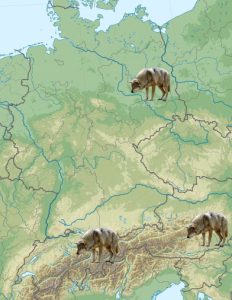 |
Die Wölfe kehren nach Westeuropa zurück. | The wolves are returning to Western Europe. |
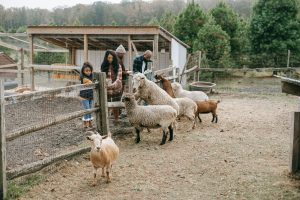 |
Landwirte haben Angst vor den Wölfen. | Farmers are afraid of the wolves. |
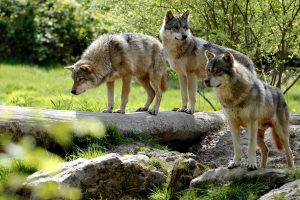 |
Ein Wolf jagt Wildtiere und Nutztiere.
Er reißt ein Schaf aus der Herde. |
A wolf hunts deer and farm animals.
It tears a sheep from the herd. |
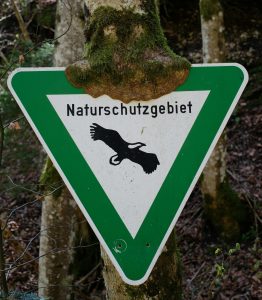 |
Naturschützer wollen die Wölfe schützen. | Conservationists want to protect the wolves. |
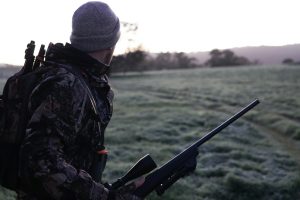 |
Die Landwirte wollen den Wolf im Jagdrecht haben. | The farmers want the right to hunt wolves. |
Jetzt bist du dran!
In your written journal, write down the following sentences. What words are missing? Fill those in as you go by using the models above.
- Die Wölfe ______ nach Westeuropa zurück.
- Landwirte haben _____ vor den Wölfen.
- Ein Wolf ____ Wildtiere.
- Der Wolf ____ ein Schaf aus der Herde.
- Naturschützer wollen die Wölfe ________.
- Die Landwirte ______ den Wolf in Deutschland im _________ haben.
3) Meinungen äußern (Expressing Opinions)
Being able to express your opinion is an important skill in any language. In German, there are two phrases you can use to say you agree or disagree respectively.
✅ Ich stimme zu, dass… (I agree that…)
✅ Ich stimme nicht zu, dass… (I do not agree that…)
Read and listen as the students give their opinions.
 |
Ich stimme zu, dass Wölfe einen wichtigen Teil des Ökosystems sind. | I agree that wolves are an important part of the ecosystem. |
 |
Ich stimme zu, dass wir den Landwirten helfen sollten, um ihre Nutztiere zu schützen. | I agree that we should help the farmers protect their farm animals. |
 |
Ich stimme nicht zu, dass Wölfe gefährlich für die Nutztiere sind. Sie jagen lieber Hirsche. | I do not agree that wolves are dangerous to farm animals. They prefer to hunt deer. |
Let’s practice.
Jetzt bist du dran!
Read the following opinions on the topic and decide if you agree or disagree. Then, create a sentence that reflects that using the phrases, Ich stimme zu or Ich stimme nicht zu…
- Die Wölfe sind gut für die Natur.
- Die Wölfe sind gefährlich für Menschen und Nutztiere.
- Wir sollen die Wölfe in Deutschland schützen.
- Die Jäger sollen den Wolf im Jagdrecht haben. (Hunters should have the right to hunt wolves).
Now, imagine you are in a friendly debate with your German-speaking friend. Record your sentences in your audio journal.

Media Attributions
- 2030-2040 fl banner large is licensed under a CC BY-NC-SA (Attribution NonCommercial ShareAlike) license
- wolfs in western europe © Sémhur/Steele is licensed under a CC BY-SA (Attribution ShareAlike) license
- Photo of sheep and goats by pexels-any-lane-5727781
- Photo of wolf pack by pexels-sunny67-21655708
- Photo of nature protection area by pexels-peter-frese-86464-381271
- Photo of hunter by pexels-elletakesphotos-2954926
- Sara_2
- farmer
- Photo of Karl by Photo by Yan Krukau: https://www.pexels.com/photo/a-teacher-posing-in-front-of-a-chalkboard-8617727/


